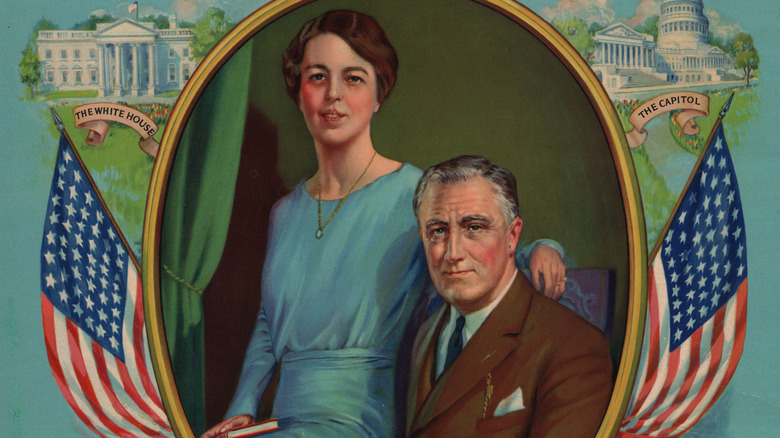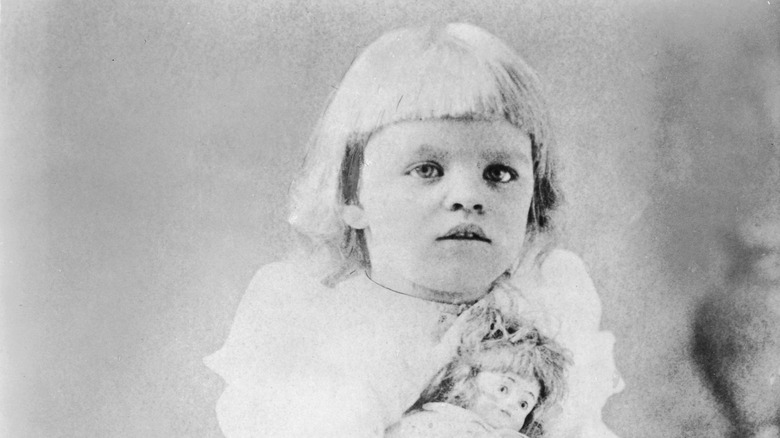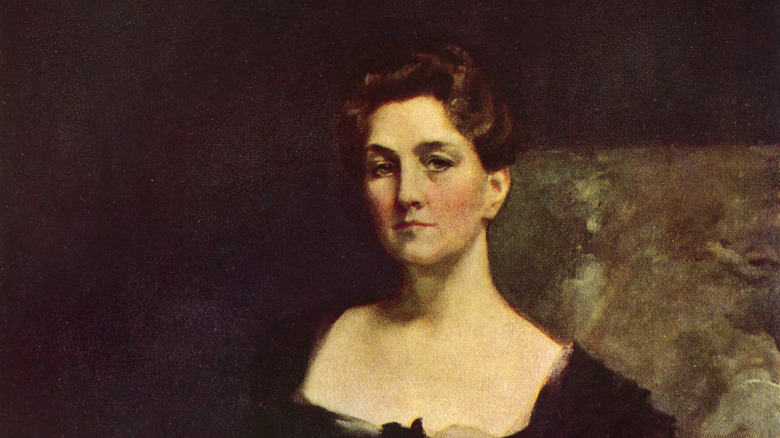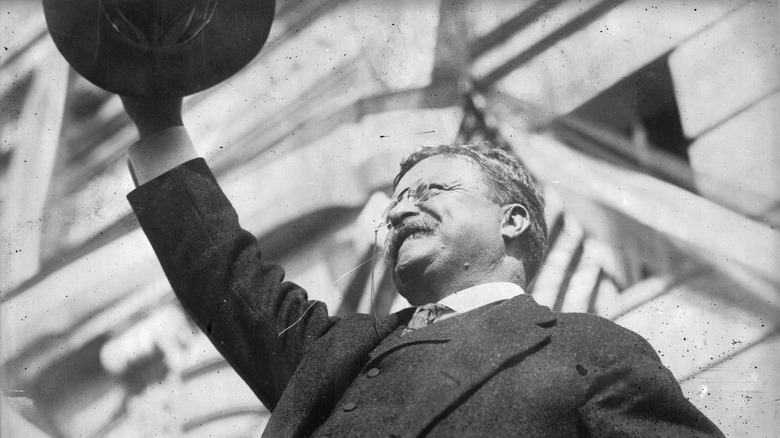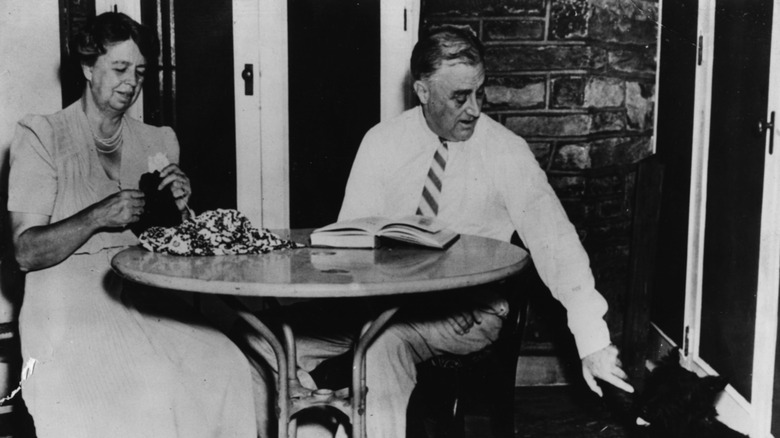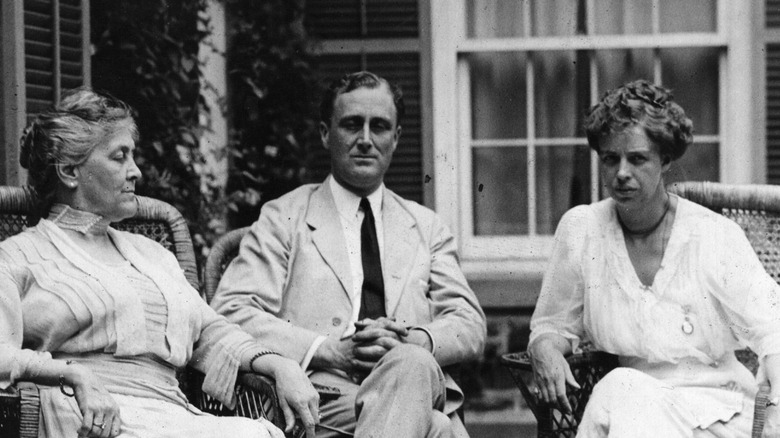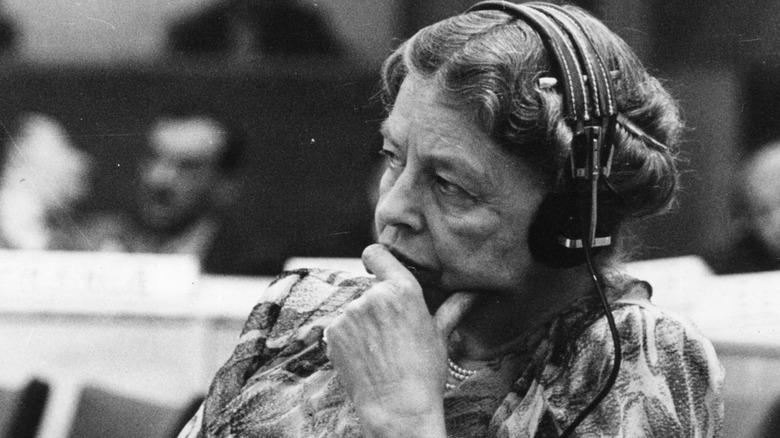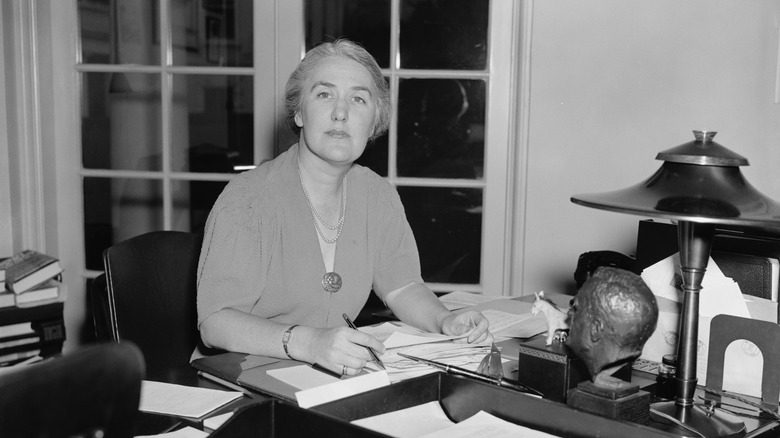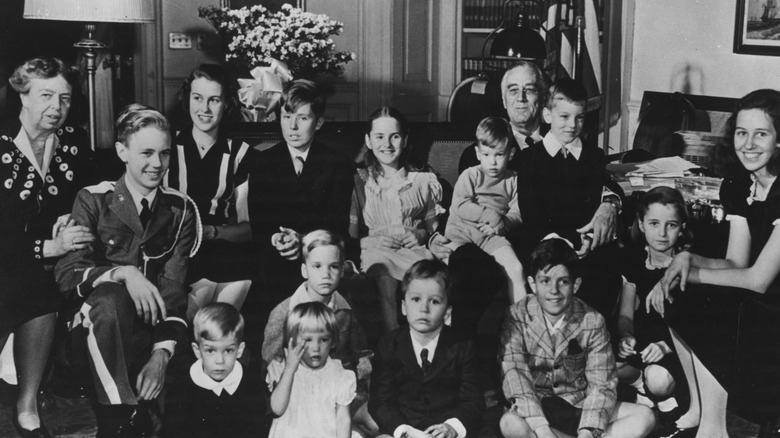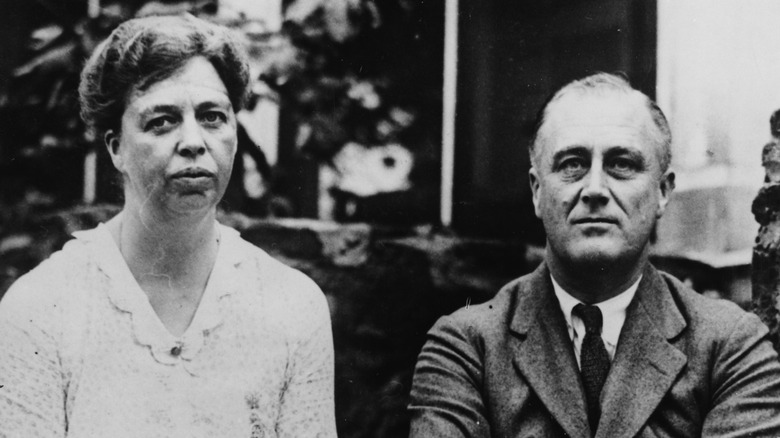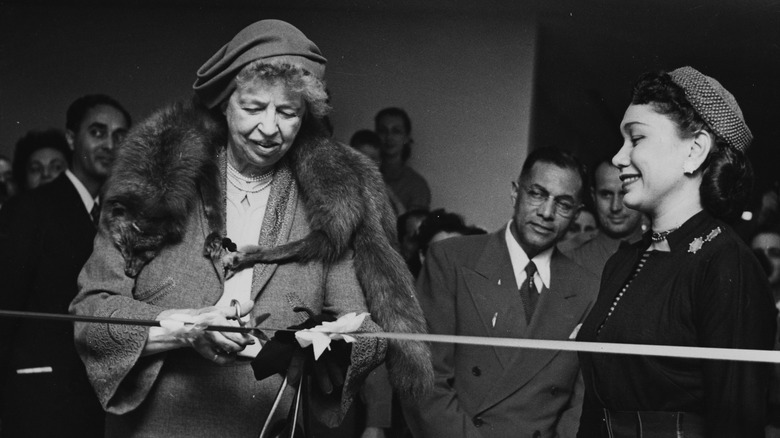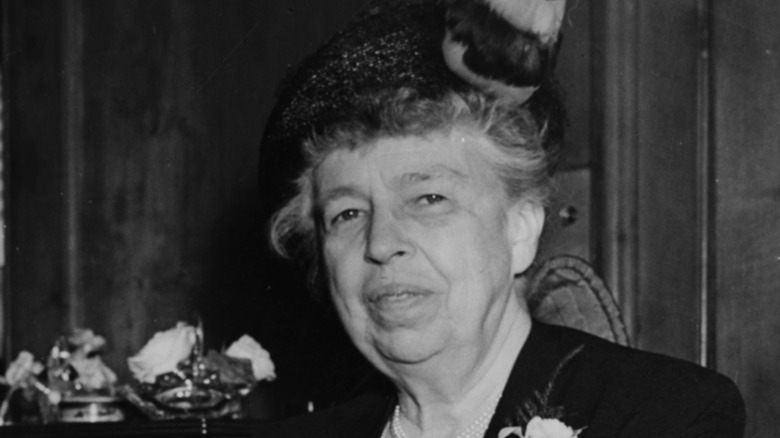The Sad Truth About Franklin And Eleanor Roosevelt's Marriage
Few political or personal marriages have been as significant to the history of America as that between Eleanor and Franklin Delano Roosevelt. Each left their mark as individuals, Franklin Roosevelt as New York governor and as the longest-serving United States president, and Eleanor Roosevelt as the longest-serving first lady and as first U.S. ambassador to the United Nations. Together they saw the White House through the Great Depression and World War II, and their separate and joint efforts to combat both issues reshaped the office of the presidency and the role of the first lady.
According to the FDR Presidential Library and Museum, Franklin and Eleanor were acquainted as children but came to romance and courtship as young adults in 1902. At the time of their marriage, Eleanor's uncle Theodore Roosevelt joked that "there's nothing like keeping the name in the family." The two were from separate branches of the Roosevelt clan, fifth cousins once removed. Their union lasted for 40 years, and Franklin and Eleanor supported each other's ambitions and ventures throughout it.
Yet a strong partnership in political matters, shared membership in the storied Roosevelt dynasty, and six children did not make Franklin and Eleanor's a happy marriage. Their relationship was a complicated one, marked by numerous episodes of hardship and heartbreak until Franklin's death in 1945.
Same Family, Very Different Childhoods
Both branches of the Roosevelt family enjoyed wealth and privilege, yet the future first family were raised in markedly different circumstances.
Eleanor Roosevelt, born in 1884, had the more difficult time of it. The Virginia Quarterly Review describes her as feeling rejected by her mother Anna Hall Roosevelt, who once told her that she must be good, as she was too plain to be anything else. Her relationship with her father was much warmer, but Elliott Roosevelt gradually succumbed to alcoholism. Both parents were dead by the time Eleanor was 10, leaving her and her brothers in the care of their strict grandmother. "Attention and admiration were the things through all my childhood which I wanted," Eleanor later remarked, "because I was made to feel ... that nothing about me would attract attention or bring me admiration."
Attention and admiration were not things a young Franklin Roosevelt needed to worry about. Born in 1882, he was the only child of James Roosevelt and Sara Delano. According to William E. Leuchtenburg of UVA's Miller Center, Franklin was largely isolated on the family's Hyde Park estate in New York, educated by private tutors. His removal from friends and peers was made up for by the love and support of his family, particularly his mother. Sara Roosevelt's attentions helped give her son a happy childhood, but she remained protective of him well into adulthood, a tendency that would later mar his marriage to Eleanor.
Franklin Roosevelt's Mother Opposed the Marriage
UVA's Miller Center speculated that Sara Delano Roosevelt would likely have disapproved of any possible match for her son. FDR's mother definitely wanted to keep her son a mother's boy, notes the New York Review. It is perhaps not surprising, then, that she wasn't privy to the courtship between Franklin and Eleanor Roosevelt, begun in 1902. When Franklin finally broke the news to her two years later and added that they planned to marry, Sara was aghast; besides her own wish to keep her son to herself, Franklin and Eleanor were only 22 and 20, respectively.
Sara insisted that the couple delay their marriage by one year. Per NPR's review of the book "Franklin and Eleanor: An Extraordinary Marriage," she engineered a cruise with herself, Franklin, and Franklin's best friend that winter, a move that left Eleanor worried. She already resented having the timeline and circumstances of their engagement dictated by her future mother-in-law; with a lengthy cruise separating them, she wondered if Franklin might not return her affections afterwards. But nothing changed upon Franklin's return to the United States, and he gently but persistently made clear to his mother that he was leaving the nest.
Uncle Teddy Stole The Stage At Their Wedding
Franklin and Eleanor Roosevelt wed on St. Patrick's Day of 1905 in New York City in the home of Eleanor's grandmother, per History Today. The annual parade was a fixture of New York even then, and the festivities outside reportedly drowned out the exchange of marriage vows. But it wasn't only joyous choruses of "Wearing of the Green" that drew attention away from the bride and groom.
With Elliott Roosevelt deceased, Eleanor was given away at the wedding by her uncle. At the time, Theodore Roosevelt was still president of the United States and at the height of his popularity. While fond of his niece, Theodore made the wedding into a St. Patrick's Day "pit stop," according to Marc Peyser and Timothy Dwyer's book "Hissing Cousins." Adoring crowds made the president the center of attention, both at the wedding and the reception. What should have been their day alone ended up with the two of them practically ignored. Teddy's daughter, Alice Roosevelt, would later put it that, "My father lived up to his reputation of being the bride at every wedding and the corpse at every funeral."
They Struggled With Physical Intimacy
Franklin and Eleanor Roosevelt shared a mutual respect and affection. In their united efforts against Sara Roosevelt's resistance to her son's marriage, they demonstrated early on their skill as a goal-oriented partnership. As a wedded couple, however, they encountered difficulties almost from the beginning, one of them in the bedroom. According to History Today, Eleanor came to the marriage with little to no education in sex. As the years passed, she developed a resigned and cynical attitude toward intercourse with her husband. Per Hazel Rowley's "Franklin and Eleanor: An Extraordinary Marriage," the four-time first lady went so far as to tell her grown daughter, Anna Roosevelt Halsted, that sex was "an ordeal to be borne."
The context of Eleanor's attitude is worth bearing in mind. In the years before widespread birth control for women, sex was coupled with potential pregnancy, and the one surefire prevention — abstinence — was rarely appreciated by young husbands with healthy sexual appetites, as Franklin was. In the first decade of their marriage, Eleanor was pregnant five times, four within the first four years. It took a heavy toll physically and emotionally. When one of their children died in infancy, Eleanor fell into such deep mourning that she later wrote of feeling a bitterness toward her husband for a time.
Mother Roosevelt Kept Interfering
Even after consenting to her son's getting married, Sara Delano Roosevelt continued to loom large in Franklin Roosevelt's life, something that Eleanor Roosevelt could hardly miss. Her relationship with her mother-in-law was not one of constant hostility, but her patience with Sara was often tried. Shortly after Franklin and Eleanor's honeymoon, the whole family moved into a six-story home with two residences, according to Hazel Rowley's "Franklin and Eleanor: An Extraordinary Marriage." Only a sliding door separated 49 East 65th Street (Franklin and Eleanor's residence) from Sara's next door.
The home was a gift from Sara (per Biography), and both residences were run by her. She showed no hesitation in using the sliding door to come and go as she pleased. Her presence and control were so all-encompassing that Eleanor later recalled weeping before Franklin, telling him through her tears that "I did not like to live in a house which was not in any way mine, one that I had done nothing about and which did not represent the way I wanted to live" (via Rowley's book). Franklin's response was to tell his wife — gently, she would say — that she was upset now but would feel differently later and so excused himself from the conversation.
Franklin Roosevelt's Devastating Affair
Eleanor Roosevelt was 13 years into her marriage in 1918. Warnings around that unlucky number proved apt on this occasion; this was the year, according to Biography, that Eleanor first discovered her husband's infidelity. Franklin Roosevelt had been conducting an affair with his wife's own secretary, Lucy Mercer. Just what the nature of that affair was is unknown and never will be. Per the Washington Post, Eleanor burned the love letters she uncovered from Mercer to Franklin. A sexual dalliance would have risked a pregnancy that could derail Franklin's family and career and Mercer's reputation. And biographer Hazel Rowley has speculated (via Roll Call) that Mercer's devout Catholic faith may have prevented a physical relationship.
That there was genuine affection between Franklin and Mercer is evident, however, as is the devastation the affair brought to Eleanor. After discovering the relationship, she offered her husband a divorce. Fierce opposition came from Franklin's political advisor, Louis Howe, and from his mother, Sara Delano Roosevelt. While Sara had initially frowned on her son's marriage, she now threatened to cut off his inheritance should he follow through with a divorce. Besides such material concerns, Rowley believes that Franklin still genuinely loved Eleanor. Whatever his reasons, Franklin chose to reconcile with his wife and promise to stop seeing Mercer.
Mutual Infidelity
Biographer Hazel Rowley wrote (via Roll Call) that Franklin Roosevelt remained in his marriage after his affair with Lucy Mercer was discovered because he "still loved Eleanor. He knew what he owed to her; he knew how much he needed her." This knowledge did not keep him from straying again. He maintained a relationship with his secretary Marguerite "Missy" LeHand. She was, according to Jean Edward Smith's "FDR," the president's constant companion for 21 years, his attendant on excursions where Eleanor was not present, and the only one to refer to him with the pet name "F.D." LeHand loved the president dearly, and Franklin was very fond of her. He provided for her in his will, but she suffered a stroke in 1941 and predeceased him.
For her part, Eleanor Roosevelt also enjoyed the company of a woman. In a review for the Washington Post, Stacy Schiff details the first lady's long-term relationship with reporter Lorena Hickok. From initial encounters during the 1932 presidential campaign, Hickok would eventually take up residence in the White House near Eleanor's rooms. Their correspondence is filled with romantic expressions and longing, though whether they had a physical relationship isn't known for sure; at least in regards to her marriage, Eleanor maintained that shared connection and common interest trumped lusty urges. On the other hand, her son James Roosevelt (quoted by Rowley) thought that his mother may have had an affair with her young bodyguard, the New York state trooper Earl Miller.
Neither Was Close to Their Children
Franklin and Eleanor Roosevelt had six children together, five of whom lived to adulthood. According to UVA's Miller Center, Franklin wasn't terribly involved in their upbringing. He was so engrossed in his work and campaigns that he hadn't the time to spare, and he believed — not unusually for his time — that it was the job of the mother to raise the children, or at least to hire a nanny to handle them. Doris Kearn Goodwin counters in "No Ordinary Time: Franklin and Eleanor Roosevelt" that Franklin doted on his children when he could give them his time. When his daughter Anna was grown and newly divorced, she took up residence in the White House and became her father's confidante.
Tasked with bringing up the children, Eleanor Roosevelt struggled to relate to her brood. She admitted later in life that "It did not come naturally to me to understand little children or to enjoy them." Eleanor also had to contend with her mother-in-law Sara Delano Roosevelt. As she had cherished Franklin, Sara showered affection on her grandchildren. More than this, she referred to them as her own. "Your mother only bore you," she went so far as to tell young James Roosevelt. "I am more your mother than your mother is" (via "No Ordinary Time"). James realized even then what a cruel thing that was to say, but even Eleanor felt that the children were more Sara's than hers.
They Lived Largely Separate Lives
The offices, ambitions, and illnesses of Franklin Roosevelt saw him frequently away from home. Just in the late 1920s, Hazel Rowley (via NPR) documents 116 weeks that Franklin was gone. Rowley also notes how many of those weeks Eleanor Roosevelt was with him: just four. For comparison, Franklin's secretary, Missy LeHand, was with him for 110 weeks. This was in part a matter of logistics; some of these trips were to do with Franklin's rehabilitation from polio, while Eleanor had the family to look after. But these long separations also occurred after Eleanor discovered Franklin's affair in 1918, an event that significantly loosened her marital ties to her husband.
During Franklin's presidency, Eleanor made numerous solo trips herself, often as an advocate for her husband's administration according to the National Park Service. At this stage in their marriage, the Roosevelts were also maintaining distance in their private lives. Franklin allowed Eleanor to build a personal cottage, Val-Kill, on the family's Hyde Park estate, where she could host whomever she liked or be left alone. In "Roosevelt in Retrospect," John Gunther claims that Franklin was often unaware when Eleanor was in the White House, and that he did not see the New York apartments his wife maintained until late in 1944. During World War II, this couple of 40 years sometimes couldn't manage a conversation except through secretaries.
They Were Sometimes Political Opponents
Whatever difficulties they had with intimacy, fidelity, and child-rearing, Franklin and Eleanor Roosevelt were united as a political partnership. Both were dedicated to the idea of public service and worked to lead America out of the Great Depression. Franklin spearheaded the New Deal and set an optimistic tone for the country through his speeches and "fireside chat" radio messages, while Eleanor advocated for her husband's policies and reached out to Americans through her newspaper columns and travels. But while the two shared a broadly liberal vision of the United States, they had areas of strong political disagreement. Sometimes, these bled into public view.
One such instance was over the internment of Japanese-Americans during World War II. As TIME reports, Eleanor was quick to ask for calm and understanding after the attack on Pearl Harbor. She made a point to be photographed with Japanese-Americans when she traveled to California after the attack. Where Franklin believed that the war effort superseded civil liberties, Eleanor argued that wartime was when belief in the Bill of Rights most counted. She advocated unsuccessfully against the internment policy; when it went through, she kept up a pragmatic front in public speeches and mitigated and challenged interment where she could in private.
An Old Mistress At The Deathbed
Franklin Roosevelt died on April 12, 1945, not long after his election to an unprecedented fourth term as president. His health had declined throughout World War II. By the time of his final campaign in 1944, many noted his gaunt appearance and declining faculties, according to UVA's Miller Center. After his reelection and the Yalta Conference the following February, Franklin retreated to a favorite residence in Warm Springs, Georgia, for rest. Eleanor Roosevelt was not with him on the trip. She remained in the White House, and it was there she received the sad word of her husband's passing.
There was more heartbreak waiting for Eleanor when she arrived in Warm Springs. As told by Joseph P. Lash in "Eleanor and Roosevelt," after she had seen her husband's body, the first lady was told that her former secretary, Lucy Mercer, now Lucy Rutherfurd, had been with Franklin when he died. Contrary to his promises never to see Rutherfurd again after their 1918 affair, Franklin maintained a friendship with his former mistress, going so far as to invite her to White House dinners. Anna Roosevelt, Franklin and Eleanor's only daughter, played hostess at these dinners, and other members of the Roosevelt and Delano families were aware of the clandestine rendezvous. Lash speculates that this last betrayal contributed to Eleanor's feeling that Franklin's death was more an abstract grief at the loss of a symbol than a personal sorrow for her.
